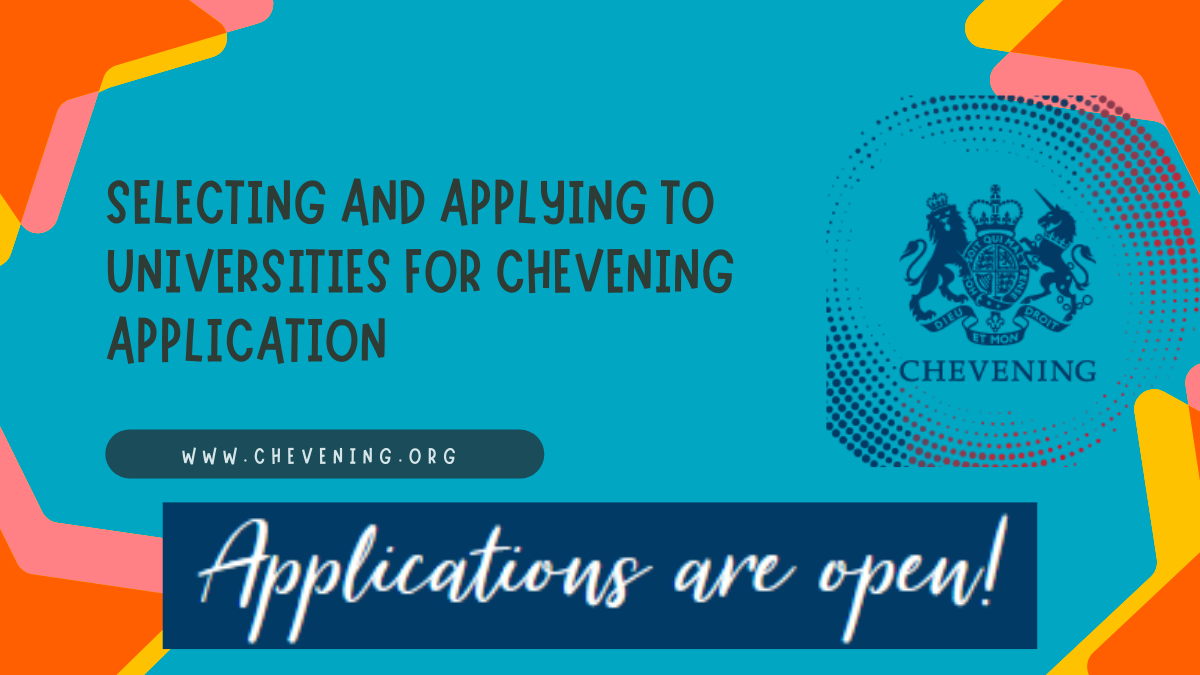Choosing Universities for Chevening Scholarship
When you apply for Chevening, you must select three universities or courses you would like to study if you receive the scholarship. These courses can be in different or the same university. Many applicants become confused about how to choose the universities and when to apply to them to obtain the unconditional offer letter. In this article, I will explain:

1) How to choose universities for Chevening?
2) Difference between conditional and unconditional offer letters.
3) Can I apply to Chevening without having an offer letter?
4) What is the best time to apply to universities to get a Chevening scholarship.
5) Can I apply for three different courses at the same university?
6) Can I apply to more than three courses/universities?
7) Can I change my university preferences after submitting my application?
How to choose universities for Chevening?
Different people have different reasons for selecting a university. Here are some of the reasons people consider before choosing universities:
1) University ranking
2) Subject ranking of the university
3) Location
4) Modules
5) Certain professors or specific research happening at that university
6) Student diversity, the extent of international diversity, student unions, and clubs.
7) Any other personal preference.
First and foremost, you must think about why you are pursuing this master’s degree, what you aim to achieve with it, which modules you are keen on learning, and where in the UK you would like to spend the year studying. Once you have considered these factors, search for universities that offer the courses of interest to you. The Chevening course finder can assist you with this.
https://www.chevening.org/scholarships/find-a-course/
Type in the course you wish to study in the search bar (marked with a blue arrow), and it will display all the universities in the UK that offer master’s in your desired subject and other similar ones.

Chevening Partner Universities
Some universities may be labelled as “Chevening partners.” This means these universities contribute a portion of the scholarship for Chevening scholars. It does not matter whether you apply to universities that are Chevening partners or not.
Next, visit each university’s page, read the details, and select the universities/courses that resonate with you.
Now, narrow down your options based on your preferences.
Let’s review the different reasons for selecting universities one by one.
1) University ranking: Universities are ranked according to various criteria by QS, Times Higher Education, and the Shanghai ranking. If you aspire to study in a top-ranked university, these rankings will help inform your decision. However, remember that very highly ranked universities will have more stringent admission criteria and lower acceptance rates.
2) Subject-wise ranking: More crucial than the overall university ranking is the subject-wise ranking of a particular university. Find out which universities are ranked highest in your field. A university may have a high overall ranking but a lower ranking in your subject area, and vice versa.
3) Location: The location of the university matters to some people. Some may prefer to study exclusively in London, drawn by its diversity and attractions, while others may opt for anywhere but London due to its high cost of living.
4) Modules: Pay close attention to the course modules offered by the university. Different universities offering the same course may have significant variations in their modules. Additionally, some courses may have slightly different names but offer the modules you are interested in and better align with your future goals. Before making a decision, it is crucial to thoroughly review the course outline and determine if it aligns with your career aspirations.
5) Certain professors/Research at that university: Some individuals may be familiar with the work of specific professors and be inspired by their impact, or they may be interested in particular research being conducted at that university. Familiarize yourself with the faculty of your chosen course, review research profiles, and see if anything piques your interest.
6) Student diversity and student unions/clubs: Different universities have varying degrees of international student populations. They also offer different types of student unions and clubs. If this is important to you, it will also influence your choice of university.
Taking the time to research and decide on your three university choices is a valuable investment. This will aid you in various stages of your Chevening application. You’ll need this information to effectively address the third question of your Chevening application, which asks:
“Outline why you have selected your three university courses, and explain how this relates to your previous academic and professional experiences and your plans for the future. Please enter new information and examples here and do not duplicate the information you have entered on this form’s work experience and education section.”
Additionally, it will assist you in crafting a convincing personal statement for each university application. Choosing your universities wisely will increase your chances of receiving an unconditional offer letter from them.
This leads us to the question:
What is an unconditional offer letter?
An unconditional offer letter signifies that the university has offered you a place to study. All you need to do now is submit a fee or arrange funding, and they will issue you a Confirmation of Acceptance for Studies (CAS), allowing you to proceed with your visa application. Then, you can join the campus in the fall when classes commence.
In contrast, a conditional letter is one in which the university asks you to meet specific conditions before issuing an unconditional letter. Some possible conditions include:
1) English language proficiency test
2) Previous degree transcripts or any other educational document.
3) Reference letters
4) Deposit fees
Can you apply to Chevening without having an offer letter?
Yes!
Chevening applications open in August/September and close in November. During this period your focus should only be on completing and perfecting your Chevening application. Chevening application does not require you to have a conditional or unconditional offer at this stage. If you have it. That’s great. You can add them to your application portal. If you do not have it, that’s absolutely alright. Having an offer at this stage does not have any effect on your application.
Chevening application timeline mentions that you must have an unconditional offer letter by 11 July 2024 if you are selected by Chevening. So you have till that time to apply and get an offer letter.
However, you will still need to specify the university and courses to which you will apply in your Chevening application.
The best time to apply to universities to get a Chevening scholarship?
As soon as you are done with your Chevening application and as soon as the admissions in your university of choice for your preferred course opens. Admissions in most universities will open around Oct-Nov 2023 for the fall 2024 intake.
Can I apply for three different courses at the same university?
Yes. You can apply to different courses at the same university or apply to three different universities. This is up to you.
Can I apply to more than three courses/universities?
Yes, you can. You only need to specify three universities/courses in your Chevening application. You can apply to as many as you want.
Can I choose three completely different courses?
The course names can be different, but they should be similar. Your course choices should align with whatever you have written in your career plan essay. It wouldn’t make sense if you were to opt for philosophy as the first choice, psychology as second and public health as third, for example.
How do I increase my chances of getting a unconditional offer letter?
Read carefully the requirements
Fulfil all the university requirements
Write a strong personal statement
Apply early
Apply to more than three universities.
Can I change my university choices later?
If you are shortlisted for an interview, you will be given a chance during the interview to reconfirm or change your university choices. So you will have an opportunity at that time to change your course/university if you so wish.
